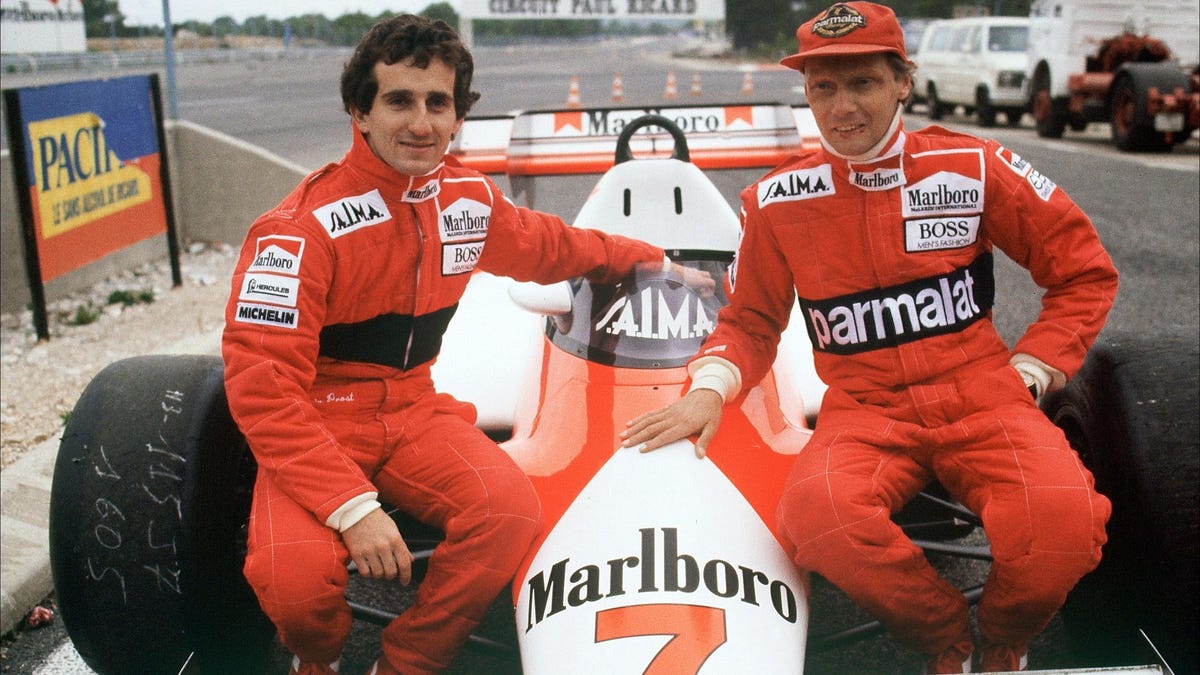You Don't Need to Score Any Pole Positions to Win a Formula 1 World Championship

Alain Prost (left) and Niki Lauda (right) pose with the McLaren they’d be driving for 1984.Photo: GERARD FOUET/AFP (Getty Images)
Winning a Formula 1 World Championship generally requires a vast skillset. You’re going to need to be fast but also reliable. You’ll probably have to be as good at qualifying as you are in the race. But in the history of Formula 1, there have been two drivers who took a season’s World Championship without scoring a pole position all year: Denis Hulme an Niki Lauda.
The first was Hulme, who took an F1 Championship back in 1967. Driving for the Brabham Racing Organization alongside team founder Jack Brabham, Hulme was not one of the three drivers who scored any pole positions in 1967; that distinction went to Jack Brabham, Jim Clark, and Graham Hill. Hulme didn’t even win the most races that year — a distinction that again went to Clark.
But the problem for Clark was his lack of reliability. Clark scored four wins to Brabham’s two during the 11-race season — but both drivers retired from as many races as they won that season. While Clark was watching from the sidelines, Hulme was busy harvesting points from six other podiums. Hulme’s worst finish in 1967 — when he did finish the race — was fourth.
The ‘67 season is one of the reasons why that era is looked upon so fondly. Performance was determined by a deep marriage between car and driver; the equipment had to be good enough to make it to the end of a race, but the driver also needed to know how to nurse a car to the finish. Hulme never needed a pole position. In fact, he usually started somewhere fourth and below that year. He just had the ability to get his Brabham across the line as frequently as possible.
Which brings us to Niki Lauda. When the three-time Champion took his final overall victory in 1984 with McLaren, he didn’t need to score a single pole position — but it wasn’t down to his specific overwhelming reliability in the race when compared to the competition. In fact, Lauda retired from six of 1984’s 16 races. It’s just that, when he was finishing (with one single exception), he was finishing on the top two steps of the podium. Drivers also only needed to count 11 races toward the Championship, so most of those retirements could be easily discounted.
G/O Media may get a commission
Save 46%
Fire TV 55″ Omni Series 4K UHD Smart TV
Alexa-enabled
The Omni Series are all produced 4K UHD picture quality and are equipped with the same interface you may be used to on a Fire TV Stick. That means they are also Alexa enabled so no need to type in your favorite movies and shows. Just hold the remote button and ask Alexa.
It was a hard-fought battle between Lauda and teammate Alain Prost; Lauda had a mere five wins to Prost’s seven. Lauda had six retirements to Prost’s five. But, as I mentioned before, Lauda was almost always finishing first or second in a race; Prost was nowhere near as consistent. At the end of the season, only half a point separated the two drivers. Elio de Angelis in third place had less than half as many points as either McLaren driver.



